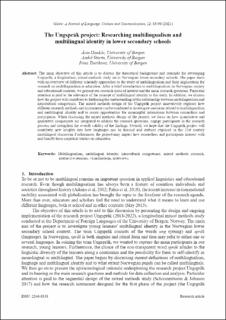| dc.contributor.author | Tiurikova, Irina | |
| dc.contributor.author | Coutinho Storto, Andre | |
| dc.contributor.author | Haukås, Åsta | |
| dc.date.accessioned | 2021-06-23T11:40:30Z | |
| dc.date.available | 2021-06-23T11:40:30Z | |
| dc.date.created | 2021-01-29T11:50:49Z | |
| dc.date.issued | 2021 | |
| dc.Published | Globe: A Journal of Language, Culture and Communication. 2021, 12, 83-98. | |
| dc.identifier.issn | 2246-8838 | |
| dc.identifier.uri | https://hdl.handle.net/11250/2760870 | |
| dc.description.abstract | The main objective of this article is to discuss the theoretical background and rationale for developing Ungspråk, a longitudinal, mixed methods study set in Norwegian lower secondary schools. The paper starts with an overview of different scholarly approaches to the study of multilingualism and their implications for research on multilingualism in education. After a brief introduction to multilingualism in Norwegian society and educational contexts, we present our research areas of interest and the main research questions. Particular attention is paid to the relevance of the concept of multilingual identity to the study. In addition, we discuss how the project will contribute to furthering the understanding of the relationship between multilingualism and intercultural competence. The mixed methods design of the Ungspråk project innovatively explores how different research methods and instruments can be combined to investigate questions related to multilingualism and multilingual identity and to create opportunities for meaningful interactions between researchers and participants. When discussing the mixed methods design of the project, we focus on how quantitative and qualitative components are integrated to address the research questions, engage participants in the research process and strengthen the overall validity of the findings. Overall, we hope that the Ungspråk project will contribute new insights into how languages can be learned and cultures explored in the 21st century multilingual classroom. Furthermore, the project may impact how researchers and participants interact with and benefit from empirical studies on education. | en_US |
| dc.language.iso | eng | en_US |
| dc.rights | Attribution-NonCommercial-NoDerivatives 4.0 Internasjonal | * |
| dc.rights.uri | http://creativecommons.org/licenses/by-nc-nd/4.0/deed.no | * |
| dc.title | The Ungspråk project: Researching multilingualism and multilingual identity in lower secondary schools | en_US |
| dc.type | Journal article | en_US |
| dc.type | Peer reviewed | en_US |
| dc.description.version | publishedVersion | en_US |
| dc.rights.holder | Copyright 2021 The Authors | en_US |
| cristin.ispublished | true | |
| cristin.fulltext | original | |
| cristin.qualitycode | 1 | |
| dc.identifier.doi | https://doi.org/10.5278/ojs.globe.v12i.6500 | |
| dc.identifier.cristin | 1886019 | |
| dc.source.journal | Globe: A Journal of Language, Culture and Communication | en_US |
| dc.source.40 | 12 | |
| dc.source.pagenumber | 83-98 | en_US |
| dc.identifier.citation | Globe: A Journal of Language, Culture and Communication. 2021, 12, 83-98 | en_US |
| dc.source.volume | 12 | en_US |

